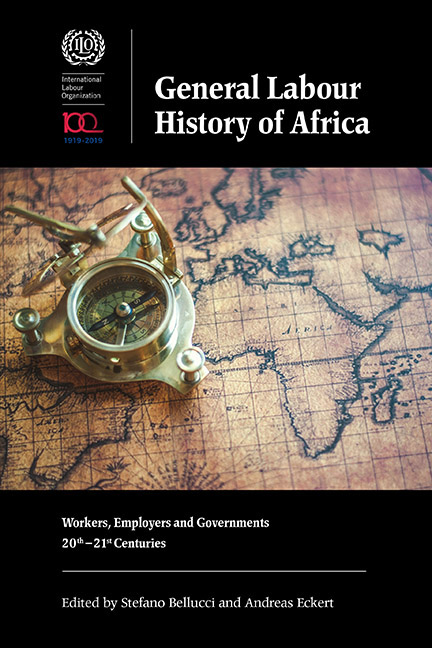Book contents
- Frontmatter
- Contents
- List of Maps and Figures
- List of Tables
- Notes on Contributors
- Foreword
- Acknowledgements
- The ‘Labour Question’ in Africanist Historiography
- Part I Free and Unfree Labour
- Part II Key Sectors
- Part III International Dimensions and Mobility
- Part IV Varieties of Work
- 10 Domestic Work
- 11 Military and Police
- 12 Crime and Illegal Work
- 13 White-Collar Workers
- 14 Sport, Tourism and Entertainment
- Part V Entrepreneurs and Self-Employment
- Part VI The State, Unions and Welfare
- Part VII Conclusions
- Select Bibliography
- Index
11 - Military and Police
from Part IV - Varieties of Work
Published online by Cambridge University Press: 21 September 2019
- Frontmatter
- Contents
- List of Maps and Figures
- List of Tables
- Notes on Contributors
- Foreword
- Acknowledgements
- The ‘Labour Question’ in Africanist Historiography
- Part I Free and Unfree Labour
- Part II Key Sectors
- Part III International Dimensions and Mobility
- Part IV Varieties of Work
- 10 Domestic Work
- 11 Military and Police
- 12 Crime and Illegal Work
- 13 White-Collar Workers
- 14 Sport, Tourism and Entertainment
- Part V Entrepreneurs and Self-Employment
- Part VI The State, Unions and Welfare
- Part VII Conclusions
- Select Bibliography
- Index
Summary
Colonial ideologues viewed soldiers and policemen as champions of order, strength and discipline. On the other hand, African nationalists and critics of colonial oppression described them as collaborators or traitors to the nationalist cause. Léopold Sédar Senghor spoke about the Tirailleurs sénégalais as the ‘Black watchdogs of Empire’; Sylvanus Olympio characterized them as ‘mercenaries’; and Frantz Fanon named them the ‘spokespersons of the colonist and the regime of oppression’. Similarly, Marxist and other radical thinkers came to the conclusion that colonial soldiers were traitors, albeit less to the national cause than to their social class.
Recent historiography, however, uses more nuanced frames for understanding the work of soldiers and policemen. Historians now make use of expressions such as ‘men in uniform’, ‘colonial intermediaries’, ‘labour aristocracy’ or ‘violence workers’, and increasingly compare military and police labour with other forms of labour. There remain, however, two challenges in addressing the history of policemen and soldiers as workers. The first challenge is to pay tribute both to the historical continuities and changes in these types of work. As is well known, several African languages acknowledge the colonial roots of police and soldiers’ work, using words of colonial origin to designate them: polisi (Bambara), mupurisa (Shona), konstebo (Swahili), polisi (Swahili), sodja (Ewe), soja (Yoruba) and musoja (Shona). However, the work lives of men in uniform have been marked by considerable changes driven by colonial rule, repression, world wars, anticolonial struggles, military coups, civil wars and democratization.
Throughout the twentieth century, the main distinctive feature of army or police labour has been the use of violence. In war, violence includes the ability to maim or kill without hesitation. It also implies the ability to bear the physical demands of long marches, difficult terrain, harsh weather conditions, poor nutrition, and the ability to transition quickly from the most tedious tasks to the violence of combat and back again. Similar features apply to police work; policemen face analogous conditions in contexts that have many of the same stressors as combat, even if they manifest in different forms and, typically, on smaller scales. Violence, broadly defined, remained a central feature of police and soldiers’ work in the twentieth century.
- Type
- Chapter
- Information
- General Labour History of AfricaWorkers, Employers and Governments, 20th-21st Centuries, pp. 333 - 360Publisher: Boydell & BrewerPrint publication year: 2019



